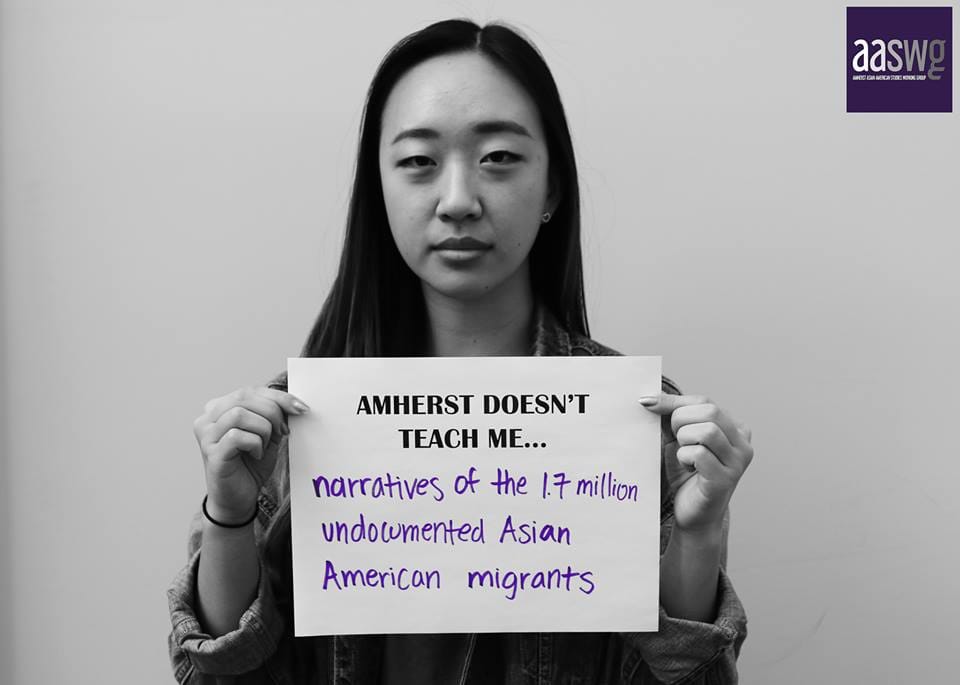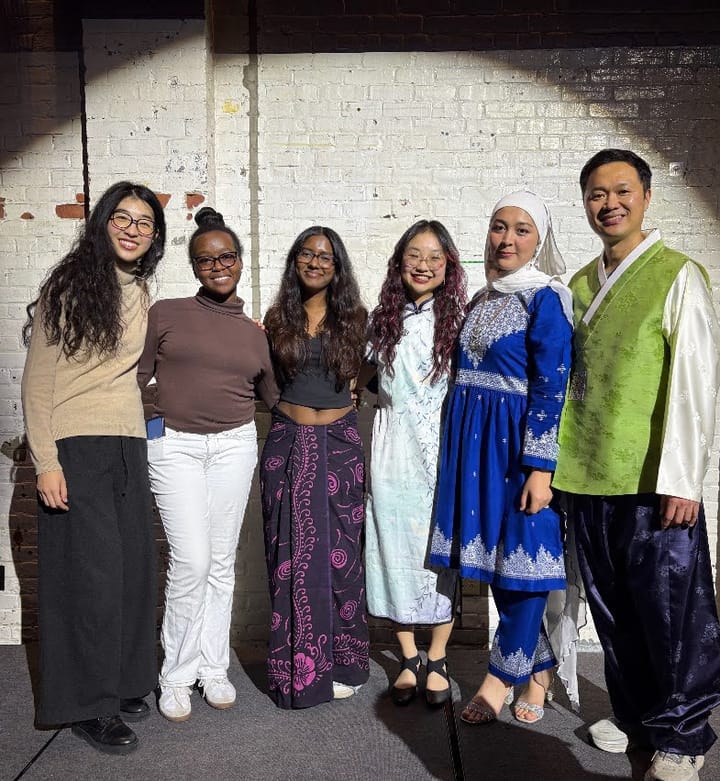"Amherst Doesn’t Teach Me” Speaks to Asian-American Identities

Last week, the Amherst Asian American Studies Working Group (AASWG) released a Facebook photograph campaign titled “Amherst Doesn’t Teach Me” to advocate for the incorporation of more Asian-American studies courses into the college’s curriculum. The post, published on April 4, consists of 35 portraits of Amherst students holding written responses to the questions: “What about Asian-American history and identity are you not being taught at Amherst?” and “Why does Asian-American Studies matter to you?”
While Asian Americans make up approximately 14 percent of the Amherst student body, there is only one tenured faculty member, Professor Robert Hayashi, and one visiting professor, Professor Franklin Odo, teaching Asian-American studies courses at the college. Between those two faculty members, there are often only one or two courses offered per semester that fall under the category of Asian-American studies.
Olivia Zheng ’20 helped to organize the campaign and feels that Asian-American studies are vital at Amherst. “You can’t study American history and not include Asian Americans. That would be a complete misrepresentation of what this country is, and so in that aspect, a stronger curriculum surrounding Asian-American issues would be valuable for both Asian-American and non-Asian-American students.”
The campaign, spearheaded by Zheng and Emily Ye ’20, aims to bring to attention both the lack of Asian-American courses and the student activists working towards a more comprehensive curriculum. Ye explained that the initial idea for the campaign came about when she and Zheng attended the East Coast Asian American Student Union conference and met other student activists who had done similar photo projects at their own schools that had gone viral.
While this campaign focuses specifically on the Amherst community, similar movements are happening on college campuses across the nation.
While this has recently come to popular attention, students in the Asian American and Pacific Islander Studies Initiative have been advocating for representation to the administration for years. The administration has hired a new tenured Asian-American faculty member for the Fall 2018 semester, which will diversify the college’s faculty and essentially double the number of Asian-American studies courses offered each semester.
While the addition of a new faculty member is a sign of progress for the AASWG, work still remains to be done to create a more comprehensive curriculum. Many students who participated in the “Amherst Doesn’t Teach Me” campaign expressed a desire for gender and sexuality courses taught in the context of Asian-American studies. “While it is great that we will have a new Asian American studies professor in the fall, he is also male identifying, so we’re hoping to hire a woman in the near future to create diversity within the faculty,” said Zheng.
Professor Odo also acknowledged the potential for diversification of faculty, saying, “Asian-American studies is such an extensive area of study, and Professor Hayashi and I are both Japanese-American males, so together we are just scratching the surface of what there is to be offered and explored.”
On the strengths and weaknesses of Amherst’s current Asian-American studies offerings, Ye said, “Amherst does a good job of teaching Asian-American history, but there still aren’t really any courses in contemporary Asian-American issues and the intersectionality of different Asian-American identities.”
The AASWG has created five- and 10-year plans with the eventual goal of creating an Asian American Studies major, similar to the new Latinx and Latin American Studies major. “It’s an interesting phenomenon among our students,” said Professor Odo, noting that the students currently advocating for the creation of an Asian American Studies major are doing so with the understanding that changes are unlikely to take place during their times at Amherst. “They’re doing it for the next generation or the next next generation, and that’s impressive because it’s not a self-serving enterprise.”
Professor Odo also acknowledged that public campaigns like “Amherst Doesn’t Teach Me” are powerful tools in putting pressure on the administration and pushing for the changes students want to see in their education.
“Last year’s work was a lot of meetings and letter writing, but it was all very behind the scenes, and we felt that it wasn’t reaching the general student body,” Zheng explained. “We wanted the photo campaign to be a way to let everyone at Amherst know that there are students who are actively advocating for these things on campus. We hope students will see it and be interested in creating a larger team.”
Due to student interest, the AASWG will be conducting another round of photographs for the “Amherst Doesn’t Teach Me” campaign on April 14 from 1-4 p.m. in Keefe Atrium.
Corrections:
In the original copy of this article, it incorrectly identified this as the first online photo campaign for Asian-American Studies, which it was not, due to one in spring 2016.
The original version of this article did not make clear that, despite its goals for the future, the newly founded AASWG has not created a 5 and 10 year plan, which it intends to do next semester.




Comments ()